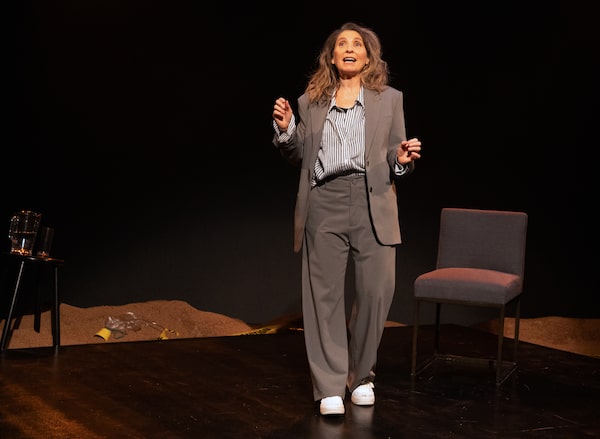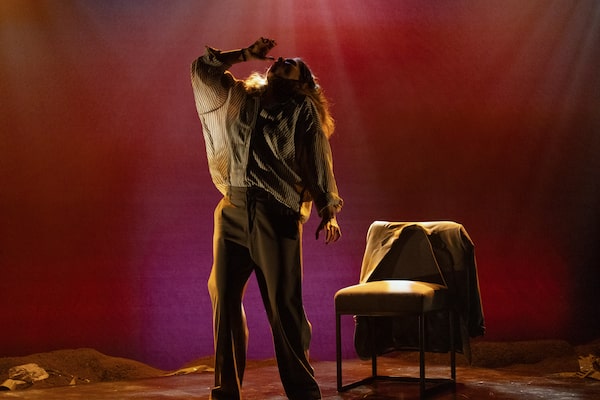
To begin her show, Diane Flacks gives the audience a picture of her at the peak of her mid-life crisis and in the wild bloom of a new love affair.Cylla von Tiedemann/Supplied
- Title: Guilt: A Love Story
- Written by: Diane Flacks
- Director: Alisa Palmer
- Actors: Diane Flacks
- Company: Tarragon Theatre
- City: Toronto
- Year: Runs to March 3, 2024
According to cynics and the broken-hearted, Valentine’s Day has always primarily been a capitalist scheme designed to sell chocolate and roses. Lately, however, it has struck me equally as a holiday set up to market personal accounts of divorce or near-divorces.
This V-Day week, my feeds were filled with such content: reviews and excerpts of serial memoirist Leslie Jamison’s post-divorce collection, Splinters, and Emily Gould’s riveting essay for The Cut about having a mental breakdown and then not leaving her husband (for now anyway).
As for my theatregoing, it was centred on the heart-day world premiere of Diane Flacks’ Guilt: A Love Story at Tarragon Theatre in Toronto (soon headed to Montreal and Winnipeg).
This funny and fearless autobiographical solo show, the theatrical equivalent of the TMI personal essay, chronicles the veteran actor/playwright’s relationship to guilt after her decision to leave her wife for a younger lover she dubs the “racehorse.”
Flacks’ confessional is just juicy enough that I’m sure it would have gone viral this week, too, if it existed online instead of in the real world – that is to say, on a theatre stage.

Flacks dances her way up on stage in slacks and oversized striped shirt, passing out mini tequila shots along the way – and doing an excellent job of moving her body in such a way as to demonstrate both the freedom and fun she is feeling at that moment.Cylla von Tiedemann/Supplied
To begin her show, the fiftysomething Jewish performer – she says her people have a particular fondness for guilt – gives the audience a picture of her at the peak of her mid-life crisis and in the wild bloom of a new love affair. These two overlapping mental states, she later says, are psychologically indistinguishable from losing your mind.
Flacks dances her way up on stage in slacks and oversized striped shirt, passing out mini tequila shots along the way – and doing an excellent job of moving her body in such a way as to demonstrate both the freedom and fun she is feeling at that moment and the fact that she is not exactly acting her age, as they say. It’s mostly exhilarating with only a hint of embarrassing.
At the heart of the guilt she feels – and is covering up by staying out late and drinking too much – is her worry that she has hurt her two boys by breaking up the family in which they found stability and safety.
How can she explain the fact that she’s a mother who goes ballistic at anyone who so much as rolls an eye at her children and yet has upended their lives now for sex and the prospect of self-fulfilment?
If she really ever caused any harm, Flacks – who previously chronicled her first pregnancy in the 2005 book and show Bear with Me – does not cause more hurt with this show: She’s obviously keeping certain details about others private, so as not to embarrass her ex or kids or invade the privacy of her new love.

Director Alisa Palmer’s production keeps everything moving nicely even when individual elements fall into shtick or cliché.Cylla von Tiedemann/Supplied
The downside of this protectiveness of others (but not herself – she depicts a series of accidents culminating in a guilt-driven panic attack with zero vanity) is that Flacks is the only really fully drawn human character in Guilt: A Love Story. There is no sounding board on stage for us to measure her guilt against reality – and guilt, as it turns out, is not a terribly dramatic emotion observed out of context. This underlines an idea expressed at one point that guilt is a self-centred emotion and not necessarily a sign that you feel for other people. But, well, this is a one-person show – what should one expect if not self-centredness?
To flesh out her show, Flacks kind of turns “guilt” into her co-star, exploring the emotion through little sketches. Some connect her experiences to the Torah stories of fratricidal Cain or Hagar wandering in the wilderness; others bring to life the metaphorical rabid raccoon that lives in a cage in her chest; others see her sucking on an invisible pipe as Sigmund Freud, while explaining his theory of guilt as an emotion that sometimes motivates the guilty act, a cause rather than effect.
Director Alisa Palmer’s production, which keeps Flacks’s energy contained on Jung-Hye Kim’s postage-stamp set, keeps everything moving nicely even when individual elements fall into shtick or cliché: a doctor talking about how many drinks a “nice Jewish girl” like her can have a week; a moment of realization that comes while swimming.
Flacks is such a special performer – she’s very watchable and is likeable because she doesn’t try to be – that her show hangs together as an entertaining evening, if not quite as a play.
Guilt will also play at the Centaur Theatre in Montreal from March 12-30, and the Royal Manitoba Theatre Centre in Winnipeg from April 3-20.